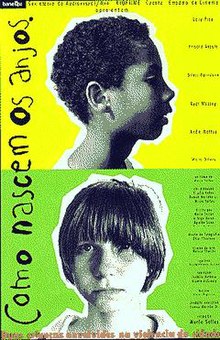
City of God is a 2002 Brazilian epic action crime film directed by Fernando Meirelles and Kátia Lund. Bráulio Mantovani's script is adapted from the 1997 novel of the same name written by Paulo Lins, but the plot is also loosely based on real events. It depicts the growth of organized crime in the Cidade de Deus suburb of Rio de Janeiro, between the end of the 1960s and the beginning of the 1980s, with the film's closure depicting the war between the drug dealer Li'l Zé and vigilante-turned-criminal Knockout Ned. The tagline is "If you run, the beast catches you; if you stay, the beast eats you."

Sônia Maria Campos Braga is a Brazilian actress. She is known in the English-speaking world for her Golden Globe Award–nominated performances in Kiss of the Spider Woman (1985) and Moon over Parador (1988). She also received a BAFTA Award nomination in 1981 for Dona Flor and Her Two Husbands. For the 1994 television film The Burning Season, she was nominated for an Emmy Award and a third Golden Globe Award. Her other television and film credits include The Cosby Show (1986), Sex and the City (2001), American Family (2002), Alias (2005), Aquarius (2016), Bacurau (2019), and Fatima (2020). In 2020, The New York Times ranked her #24 in its list of the 25 Greatest Actors of the 21st Century.

Orfeu is a 1999 Brazilian romantic drama film directed by Carlos Diegues, and starring Toni Garrido, Patrícia França and Murilo Benício. Based on the play Orfeu da Conceição by Vinicius de Moraes, the film retells the Greek legend of Orpheus and Eurydice, setting it in the modern context of Rio de Janeiro during Carnival.
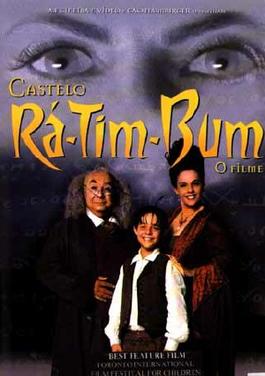
Castelo Rá-Tim-Bum is a 1999 Brazilian film directed by Cao Hamburger, based on the Castelo Rá-Tim-Bum TV series.

Entranced Earth is a 1967 Brazilian Cinema Novo drama film directed by Glauber Rocha. It was shot in Parque Lage and at the Municipal Theatre of Rio de Janeiro. The film is an allegory for the history of Brazil in the period 1960–1966.
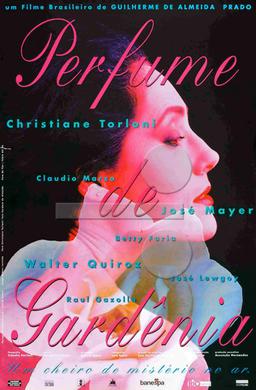
Perfume de Gardênia is a 1992 Brazilian-Argentine drama film directed by Guilherme de Almeida Prado. It was screened at the 1992 Montreal World Film Festival. The filming took place in April 1991, with its production lasting until February 1992.

The Invisible Collection is a 2012 Brazilian drama film, directed by Bernard Attal and starring Vladimir Brichta, Walmor Chagas and Ludmila Rosa. The film is based on the 1925 short story of the same title by Stefan Zweig. It was shot in Salvador and Itajuípe, Bahia.
The 2nd Grande Prêmio Cinema Brasil ceremony, presented by the Ministry of Culture of Brazil, honored the best audiovisual productions of 2000 and took place on February 10, 2001, at the Palácio Quitandinha in the city of Petrópolis, Rio de Janeiro beginning at 8:30 p.m. BRT. During the ceremony, the Ministry of Culture presented the Grande Prêmio Cinema Brasil in 18 categories. The ceremony, televised by TV Cultura and Televisão Educativa, was directed by Bia Lessa and hosted by stylist Felipe Veloso.

Por Trás do Pano is a 1999 Brazilian comedy-drama film directed by Luiz Villaça. It stars Denise Fraga, Pedro Cardoso, Luís Melo, Ester Góes and Marisa Orth. The plot follows the story of Helena (Fraga), an insecure actress who is married to Marcos (Cardoso), as she receives an invitation to perform in a play alongside the famous actor Sérgio (Melo), who lives a conjugal crisis with his wife Laís (Orth) due to his involvement with his former wife Alexandra (Góes).

Carla Camurati is a Brazilian actress and filmmaker. She became notorious for acting in several Rede Globo telenovelas in the 1980s. She also acted on children's theater, starred in films—including Eternamente Pagú for which she won the Best Actress Award of Festival de Gramado—and was cover of the Brazilian edition of Playboy. In 1995, she debuted as a director with Carlota Joaquina, Princess of Brazil, an important mark in the period of Cinema of Brazil known as "Retomada". She was the director of Fundação Theatro Municipal do Rio de Janeiro that administers the Teatro Municipal from 2007 to 2014.
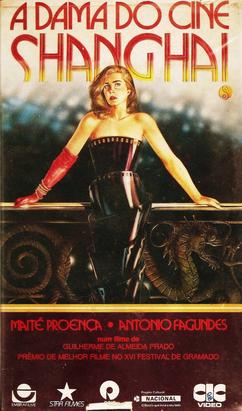
The Lady from the Shanghai Cinema is a 1988 Brazilian thriller film directed by Guilherme de Almeida Prado. The film borrows some references from Hollywood films noirs of the 1940s, mainly Orson Welles' The Lady from Shanghai; its name is a play on the title of Welles's film.
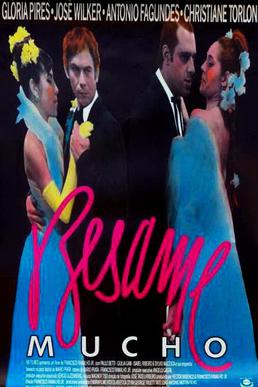
Besame Mucho is a 1987 Brazilian romance drama film directed by Francisco Ramalho Jr., based on the play of the same name by Mário Prata.

Mango Yellow is a 2002 Brazilian drama film directed by Cláudio Assis. It stars Matheus Nachtergaele, Jonas Bloch, Dira Paes, Chico Díaz, and Leona Cavalli as working-class people who engage in amorous and social encounters, with most of the action taking place in a hotel and a bar. The directorial debut of Assis, the film was partially inspired by his previous short film Texas Hotel. It was filmed on a low budget in the suburbs of Pernambuco.

Ana Luiza Machado da Silva Muylaert, known professionally as Anna Muylaert, is a Brazilian film and television director, producer and screenwriter.

Memórias Póstumas is a 2001 comedy-drama film directed by André Klotzel based on The Posthumous Memoirs of Bras Cubas by Machado de Assis. It follows Brás Cubas, played by Reginaldo Faria and Petrônio Gontijo, as he recounts his life after his death.

Alê Abreu is a Brazilian film director, screenwriter, character animator, film editor and producer. Sírius, his first short film, debuted at the 1993 Anima Mundi as the only Brazilian animation that year. It won the Best Film Award at the Festival de Cine para Niños y Jovenes and was also screened at the Mostra Internacional de Cinema São Paulo and at the section Animation for Children of the Hiroshima International Animation Festival. His second short film, Espantalho, released in 1998, won the 3rd Best Brazilian Animation at the Anima Mundi, the Best Art Direction Award at the Brazilian Film Festival of Miami, and was nominated for Best Animated Feature at the 1st Grande Prêmio Cinema Brasil. His first feature film, Garoto Cósmico, debuted at the 2007 Anima Mundi. In 2013, at the Ottawa International Animation Festival, he released his second film, Boy and the World. This film became an international success, was nominated at the 88th Academy Awards for Best Animated Feature, and won several prizes, including the Best Feature Film at the Annecy International Animated Film Festival and the Best Animated Feature-Independent at the Annie Awards.

Something in the Air is a 2002 Brazilian drama film directed by Helvécio Ratton. It is based on the actual history about Rádio Favela, a community radio broadcaster established in Aglomerado da Serra, a favela of Belo Horizonte in the 1980s. It shows how it was persecuted by the police while four friends try to keep the radio. Alexandre Moreno, Adolfo Moura, Babu Santana and Benjamim Abras were chosen to star the film after 3,000 people tried for their roles. It was shot in Aglomerado da Serra and used about 300 of the local people as extras.
Eduardo Escorel de Morais, most known as Eduardo Escorel, is a Brazilian film editor and director. He debuted as an editor on the Joaquim Pedro de Andrade's The Priest and the Girl (1965). With his first feature film, Lição de Amor, he won the Best Director Award at the 1976 Gramado Film Festival. He was also awarded Best Director for his second film, Ato de Violência, this time at the 1980 Brasília Film Festival. He won Best Editing Award for Guerra Conjugal and O Chamado de Deus at the 1974 and 2000 Brasília Film Festival respectively, and for Dois Perdidos numa Noite Suja at the 2002 Gramado Film Festival.

Lucio Flavio is a 1977 Brazilian film directed by Héctor Babenco based on the book of the same name by José Louzeiro, who co-wrote the screenplay. It stars Reginaldo Faria as Lúcio Flávio, a famous bandit in Rio de Janeiro in the 1970s. Babenco did not want to limit the story to Lúcio Flávio, and stated it was also a film about Esquadrão da Morte, a death squad from the 1960s.
Anjos do Arrabalde is a 1987 Brazilian drama film directed by Carlos Reichenbach.
